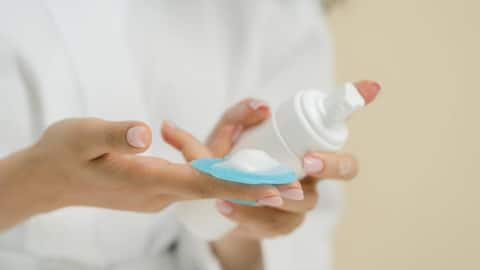Expert warns against harmful ingredients commonly found in skincare products
What's the story
In the quest for radiant and healthy skin, the choices we make regarding skincare products play a pivotal role. However, as we increasingly prioritize the well-being of our skin, understanding what to avoid in skincare is also essential. Dr. Asmita Dhekne Chebbi, venereology & leprosy dermatologist, cosmetologist, Apollo Spectra Hospital, Bengaluru, shares her insight helping us distinguish the harmful ingredients.
Ingredient 1
Paraben
Amidst the allure of flawless complexions, we must shed light on the perilous constituents commonly found in skincare formulations. "Parabens, ubiquitous preservatives, stand as culprits atop the list. Despite their efficacy in prolonging shelf life, mounting evidence links parabens to endocrine disruption, potentially disrupting hormonal balance and manifesting in adverse health effects - including cancer," says Dr. Dhekne Chebbi.
Ingredient 2
Sodium lauryl sulfate
"Sodium lauryl sulfate (SLS) and its derivative, sodium laureth sulfate (SLES), serve as foaming agents in numerous skincare products, delivering that satisfying lather," explains Dr. Dhekne Chebbi. Their harsh cleansing nature strips the skin of its natural oils, leading to irritation, dryness, and exacerbating conditions like eczema or dermatitis. They are used to create lather and function as surfactants.
Ingredient 3
Synthetic fragrance
The enchanting fragrance that permeates skincare delights harbors a dark secret. You have no idea what's in it. "Often a cocktail of undisclosed chemicals and synthetic fragrances may trigger allergies, skin sensitivities, or even respiratory issues," says the expert. The allure of a pleasant scent juxtaposed with the potential harm it conceals demands our scrutiny. Choose products that are natural or fragrance-free.
Ingredient 4
Formaldehyde-releasing agents
Let us not overlook the deceptive charm of formaldehyde-releasing agents, stealthily present in various cosmetics as preservatives. Also referred to as formalin, glyoxal, and bronopol, these agents can sensitize the skin and are classified as human carcinogens. According to the expert, while these agents prevent bacterial growth, the release of formaldehyde by the products poses grave health hazards when absorbed through the skin.
Ingredient 5
Silicon
Silicones, revered for their velvety feel and instant smoothening effects, veil the skin, impeding its natural respiration and clogging pores. "Extended use can lead to a vicious cycle of dependency, as the skin becomes reliant on these occlusive substances, hindering its intrinsic rejuvenating processes," says Dr. Dhekne Chebbi. They may also trap debris, sweat, and bacteria on the skin, causing breakouts or irritation.
